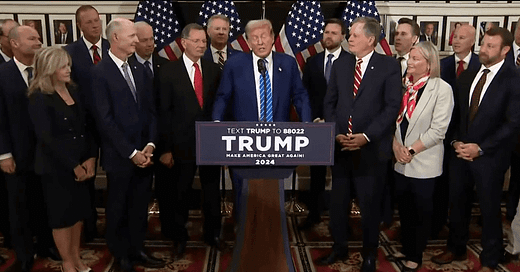
Hello All,
I am delighted to say that the latest instalment of what is one my favorite series is here. This is the interviews with an anonymous, senior Republican source who understands the state of the GOP in a visceral way that I could never hope to replicate. I trust this person to speak their views truthfully and perceptively. They have been proven to be right time and time again—and I have learned a great deal from them over the last few years. Below are the first two interviews that they have given if you want to see more. They were under paywall as they were months old, but I have just taken the paywall off—so enjoy.
If you look back at these, you can see how well this person understood where the GOP was and where it was going—and US politics as a whole. And as a reminder, here is how this person described themselves in the first interview and I can heartily attest to everything that they say.
I’ve been involved in Republican politics for over 45 years and have developed deep personal relationships with each of the last six Republican Presidents. I maintain personal and professional connections to many of the current Republican leaders in the party, the Congress and a broad spectrum of policy makers. I know where the party has been, where it is today and where it is going tomorrow.
Enjoy.
The Interview With A Senior Republican: Part 3
How total is Trump’s control over the Republican Party after four months in office?
At the moment, Trump has a strong grasp on the party. Republicans largely follow his lead on tariffs, spending, health care, and more. But his control is not complete. As we move closer to the midterms, it will become increasingly difficult for Trump to manage the narrow GOP majority in the House, where members will be focused on protecting their seats.
Trump’s real objective is to hold onto the 30–40 percent of the Republican base that remains loyal to him, using that bloc to enforce ideological discipline across the party. That works in primaries. But as we near general election season, that grip will weaken.
How much will Senate Republicans be willing to defy the White House on the “Big, Beautiful Bill”?
Senate Republicans will make changes to the bill, but mostly at the margins. These tweaks will be cosmetic rather than structural. GOP senators understand that they need to pass an economic package to improve their chances of holding the majority in 2026. That political reality will drive them to support the bill in a form largely aligned with the White House’s framework.
Is there any disquiet in the party about Trump and the Trump family making financial deals with governments around the world?
Yes—and it’s intensifying. A significant portion of the party is deeply concerned about the extent of Trump’s grifting and self-enrichment. This is not merely a matter of perception. It is happening in plain sight.
The most consistent and serious complaint I hear from Republican officials is that this behavior has gone far beyond what is politically—or ethically—sustainable. If it continues unchecked, it will turn the last two years of Trump’s presidency into a grinding parade of congressional investigations and legal scrutiny, damaging not just the Trump brand, but the credibility of the Republican Party itself. Ultimately, this kind of corruption undermines public trust and will prove deeply damaging to the country as a whole.
Does the party actually support his tariff policy?
It depends on how you define support. Many Republicans agree that the legacy trade system disadvantages the United States—particularly with foreign VATs and higher tariffs on U.S. goods. There’s consensus that something needed to change.
But frustration grows around the erratic way Trump has implemented tariffs. If he had used them strategically—to strengthen alliances and increase pressure on China—many Republicans would have backed the approach, even if they didn’t favor full decoupling.
Others simply see tariffs as a tax. Many Republicans oppose this on principle. A few see it as a clever way to reduce the deficit while not raising personal income taxes. Trump’s challenge is to keep them high enough to generate revenue, but low enough to avoid choking commerce. He seems to believe China can tolerate selling into the U.S. market at higher tariff rates. In return, he may offer concessions to China on non-economic issues, and use the revenue to fund his domestic priorities.
In the end, will there be more damage done to U.S.-China or U.S.-EU trade?
Most likely U.S.-EU trade. As noted, Trump will aim to fine-tune tariffs on China to maximize revenue while keeping trade flowing. Full decoupling remains too costly, economically, in the lead-up to the midterms.
The EU, however, is experiencing a more fundamental shift. Trump’s approach has introduced a level of strategic uncertainty into the transatlantic relationship. That’s a shock to the European system, and one that will take time to absorb. The result will be real and lasting friction in trade between the two sides.
Was there any chance that Trump would have imposed meaningful extra sanctions on Russia?
Trump will resist doing so for as long as possible. Why he takes this position is unclear, but it’s one of the few issues that could cause a serious rift within the Republican Party.
Perhaps he has longstanding business ties with Russian interests. Perhaps he views Russia as a more favorable partner than Ukraine. Or perhaps he believes Russia could be aligned with the U.S. against China—a view I don’t share, but one he may hold.
Regardless, Europe must now take the lead. It should strengthen its military posture and hit Russia hard with sanctions. This is the role Europe has long claimed to want—now is the time to assume it.
That said, sanctions alone won’t suffice anymore. They are useful in the early stages of conflict but lose potency over time. The West—and any allies willing to join—must escalate support for Ukraine, including advanced targeting capabilities for strategic strikes on military and industrial infrastructure inside both Ukraine and Russia. Chancellor Merz’s decision over the weekend to authorize Ukraine to strike targets anywhere inside Russia using German weapons is a commendable step toward winning the war.
Simultaneously, the West should pursue every possible method of lowering oil prices: opening new fields, increasing subsidies, and pressuring Saudi Arabia to boost output. Those tactics would do more damage to Russia’s war effort than any sanctions package and are the fastest way to end the war decisively.
What chance do you believe there is that Trump will be willing to sell weapons to Ukraine?
This would be a brilliant move by Trump—one that could bring the war to a swift and favorable conclusion while staying firmly within the MAGA framework. It would stimulate the U.S. economy, expand transatlantic defense trade, and reassert American influence.
But so far, there’s no sign that Trump is considering this. That is disappointing—and baffling.
Can Europeans trust Trump to defend NATO members any more?
I would not trust Trump to defend a NATO country if attacked by Russia. I could foresee a situation where Putin invades a part of a country such as the Russian-speaking portions of Estonia and dares Trump to commit U.S. troops to push out the Russian army. In that scenario, I do not believe Trump would support invoking Article V to justify a collective military response.
Has Trump actually moved away from Israel in Middle Eastern politics?
It seems as if Trump has moved away from Israel. The big test will be whether Trump puts sanctions on Iran for scaling up their nuclear program. At the moment, he does not seem inclined to do this and in fact will continue his reputation for being a “great retreater” in negotiations. President Trump seems to be the antithesis of Teddy Roosevelt: speak loudly and carry a little stick.
My Comments For Subscribers
Keep reading with a 7-day free trial
Subscribe to Phillips’s Newsletter to keep reading this post and get 7 days of free access to the full post archives.




